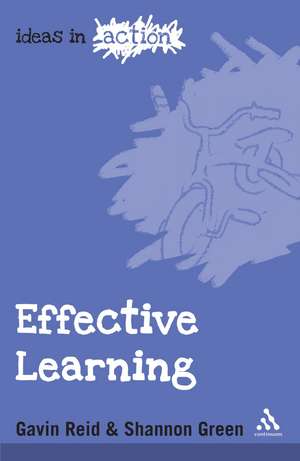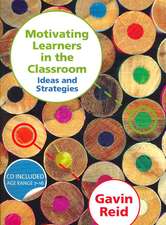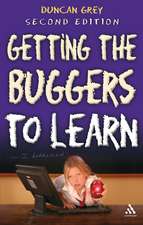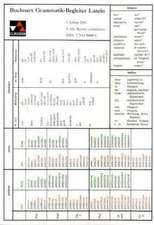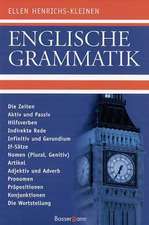Effective Learning: Ideas in Action
Autor Dr. Gavin Reid, Shannon Greenen Limba Engleză Paperback – 11 iul 2009
For a young person to have a successful career at school and become a lifelong learner it is essential that they develop the skills to learn effectively. This timely book looks at ways in which teachers can identify and deal with barriers to learning and suggests strategies which motivate young people to develop an interest in their own learning.
Preț: 73.46 lei
Preț vechi: 122.73 lei
-40% Nou
Puncte Express: 110
Preț estimativ în valută:
14.06€ • 15.28$ • 11.82£
14.06€ • 15.28$ • 11.82£
Carte disponibilă
Livrare economică 31 martie-14 aprilie
Preluare comenzi: 021 569.72.76
Specificații
ISBN-13: 9781847065322
ISBN-10: 1847065325
Pagini: 112
Dimensiuni: 138 x 216 x 10 mm
Greutate: 0.15 kg
Editura: Bloomsbury Publishing
Colecția Continuum
Seria Ideas in Action
Locul publicării:London, United Kingdom
ISBN-10: 1847065325
Pagini: 112
Dimensiuni: 138 x 216 x 10 mm
Greutate: 0.15 kg
Editura: Bloomsbury Publishing
Colecția Continuum
Seria Ideas in Action
Locul publicării:London, United Kingdom
Caracteristici
Innovative format - each technique is presented on the left-hand page, and the facing right-hand page shows a practical activity to put that technique into practice.
Cuprins
Contents
1.Identifying and dealing with Barriers to Learning
- Layout of the classroom
- Use Scaffolds
- Make Connections
2. Learning to Learn
- Introduce a metacognitive cycle
- Develop independent learning
- Help students identify their learning style
- Identifying learning style through observation
- Recognise the importance of attribution theory
- Stress proof the student
- Develop cooperative and collaborative learning
3.Memory
- Do not overload
- Prioritise
- Organising information
- Use Headings and Sub-headings
- Chunk
- Make connections
- Re-enact
- Discuss
- The 5 R's - recognise, revise, review, recall, reflect
4. Motivation
- Stimulate to motivate
- Locus of control
- Make individual education plans motivating
- Make motivation intrinsic
- Encourage creativity
5. Reading and Creative Writing
- practice blending sounds
- encourage inferential reading
- encourage critical comprehension in reading
- encourage creative thinking
- develop reading goals
- selecting books for students
- use art and visuals for creative writing
- use prompts for creative writing
- provide a comfortable place for students to read
- expand vocabulary
- creating and using a personal word bank
6. Successful Learning
- Use peer interaction to develop learning competencies
- Time management
- Maths Strategies
- Use multiple intelligences
7. Whole school approaches
- Promote emotional literacy
- Becoming emotionally prepared for the task
- De-stress the school
- Prioritise effective learning through staff development
1.Identifying and dealing with Barriers to Learning
- Layout of the classroom
- Use Scaffolds
- Make Connections
2. Learning to Learn
- Introduce a metacognitive cycle
- Develop independent learning
- Help students identify their learning style
- Identifying learning style through observation
- Recognise the importance of attribution theory
- Stress proof the student
- Develop cooperative and collaborative learning
3.Memory
- Do not overload
- Prioritise
- Organising information
- Use Headings and Sub-headings
- Chunk
- Make connections
- Re-enact
- Discuss
- The 5 R's - recognise, revise, review, recall, reflect
4. Motivation
- Stimulate to motivate
- Locus of control
- Make individual education plans motivating
- Make motivation intrinsic
- Encourage creativity
5. Reading and Creative Writing
- practice blending sounds
- encourage inferential reading
- encourage critical comprehension in reading
- encourage creative thinking
- develop reading goals
- selecting books for students
- use art and visuals for creative writing
- use prompts for creative writing
- provide a comfortable place for students to read
- expand vocabulary
- creating and using a personal word bank
6. Successful Learning
- Use peer interaction to develop learning competencies
- Time management
- Maths Strategies
- Use multiple intelligences
7. Whole school approaches
- Promote emotional literacy
- Becoming emotionally prepared for the task
- De-stress the school
- Prioritise effective learning through staff development
